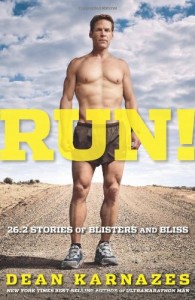
Ultra-marathon runner Dean Karnazes’ third book is a jumble of unrelated and slightly arrogant stories. Courtesy of Amazon.com
This past March, ultra-marathon runner Dean Karnazes released his third book, “Run! 26.2 Stories of Blisters and Bliss.” His first book, “Ultra Marathon Man: Confessions of an All-Night Runner,” launched him into fame — it became a New York Times bestseller and landed him on Time magazine’s “Top 100 Most Influential People” list. So Karnazes certainly set the standard high for his next few works.
His second book, “50/50: Secrets I Learned Running 50 Marathons in 50 Days” was simply a collection of running tips for people hoping to follow in his footsteps and try out ultra long distance running. It didn’t sell very well, but it contained quality information and filled a niche that wasn’t available in many other outlets.
This new book is, in many ways, the spiritual successor to his first, though the tone is different. His first book told the uplifting and inspiring story of returning to running after an almost 15-year-long hiatus, during a mid-life crisis. He worked his way up into ultra marathon running and even finished some of the most extreme runs out there, like a 100-mile run through the Sierra Nevada mountains and another run through Death Valley in 120 degree heat.
Rather than being inspirational, however, Karnazes’ third book seems more about self-promotion and self-adulation than anything else. The book, as stated in the title, tells 26.2 (.2? How does one tell a fifth of a story? A shorter story is still a full story…) unconnected stories — the only thread that unifies them is the conceited, “look what I can do” tone.
The stories’ topics range from how he almost got run over by a fan while training one night, to how he took a friend under his wing and helped him eventually complete one of the most grueling ultra marathons, to how he ran a full marathon on the open ocean in what’s essentially a giant inflatable hamster ball.
Only a few of the stories are related, and the book seems to bounce all over the place. Also, every few stories, Karnazes includes a clichéd and uninteresting piece about how running is so fulfilling and has made him a better man. The book already feels like it has too much filler, but these stories only seem to exaggerate the feeling.
Overall, the book is not as cohesive, interesting or moving as his first effort, but isn’t all bad. Even though Karnazes is often up his own ass with self-congratulation, some of his accomplishments are udeniably impressive. For example, one of the more interesting stories revolves around a series of races called “The 4 Deserts.”
These races are seven-day-long, 250km races over the most inhospitable deserts in the world: Gobi, Sahara, Atacama, and — if you are able to finish the first three — Antarctica. Karnazes is the first man ever to finish all four races in one year. These remarkable stories are certainly a somewhat good read, as long as you can get over the smug tone.
If you are a big ultra marathon runner or a Karnazes fan, then this book is for you. Otherwise, the lack of a unifying plotline and the arrogant writing style will definitely turn you off. However, if you haven’t read it before, Karnazes’ first book is certainly worth a read.
Karnazes is currently running across the country, over the course of 75 days, in collaboration with the television show “Live with Regis and Kelly.” All the proceeds will go to Action for Healthy Kids, an organization that addresses good nutrition and increased activity for youth.
Penney is a member of the class of 2012.



